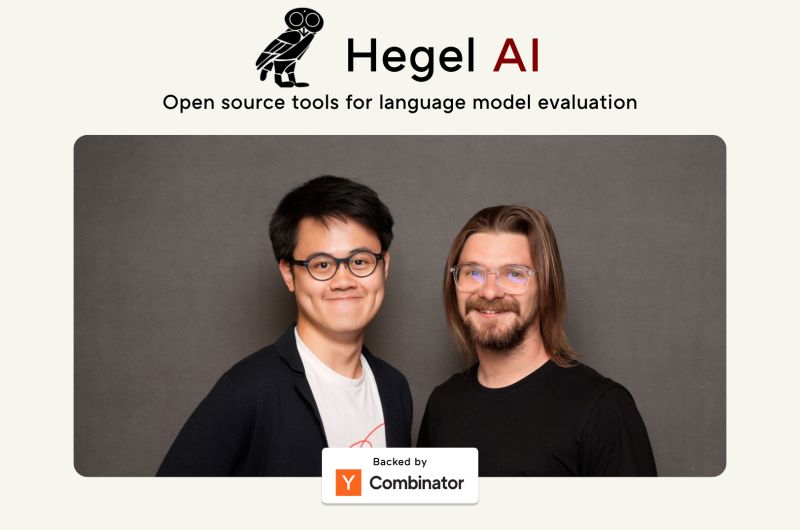Unveiling Hegel AI: Revolutionizing Generative AI Development
Are you a developer looking to harness the power of generative AI models? Do you often find yourself grappling with challenges related to model drift, evaluating the latest models, or creating effective evaluation systems? If so, you're not alone. Enter Hegel AI, the startup that's changing the game for developers by providing open-source tools for developing generative AI applications. In this comprehensive article, we'll delve deep into the world of Hegel AI, exploring its origins, mission, solutions, and the remarkable team behind it.

Who Are the Visionaries Behind Hegel AI?
Hegel AI, established in 2023, is the brainchild of two exceptional individuals who have left their mark in the world of artificial intelligence and development.
Steven Krawczyk: The AI Pioneer
Steven Krawczyk, one of Hegel AI's co-founders, brings a wealth of experience to the table. His journey began with a stint at Google, where he worked on a machine learning library, PyTorch/XLA. From there, he ventured into AI Infrastructure at Amazon Prime Video and later delved into the world of Investment Research at Bridgewater Associates. With a strong foundation in AI and machine learning, Steven is passionate about pushing the boundaries of generative AI.
Kevin Tse: The Developer Extraordinaire
Kevin Tse, the other driving force behind Hegel AI, has an impressive background. Prior to co-founding Hegel AI, he contributed to the development of PyTorch at Meta AI and worked on quantitative development at Bridgewater Associates. With a solid educational background in Computer Science and Economics from the University of Chicago, Kevin is committed to advancing the field of AI and its practical applications.
What Is Hegel AI's Core Offering?
Hegel AI has positioned itself as a game-changer in the world of generative AI by offering open-source tools for developing applications with generative AI models. Whether you're working with Large Language Models (LLMs), vector databases, or text-to-image models like Stable Diffusion, Hegel AI's tools are designed to assist you in finding the right model, prompt, configuration, and continuously monitoring their behaviors in production.

The Challenge: Overcoming Hurdles in Generative AI
Developers building with language models often encounter three significant challenges:
Model Drift: Is the latest version of your AI model truly an improvement, or is it drifting away from the desired performance?
New Models: With new models emerging regularly, how can developers keep up with the latest advancements and seamlessly integrate them into their projects?
Insufficient Evaluation Systems: Beyond academic metrics and subjective evaluations, there's a need for robust evaluation systems that provide meaningful insights into model performance.
Hegel AI recognizes these challenges and is determined to provide a solution.
The Mission: Democratizing High-Quality Evaluation
Hegel AI's mission is crystal clear: to make high-quality evaluation and testing systems accessible to everyone. To achieve this, they are building an open-source platform for language model evaluation. Developers can leverage their product to monitor regressions in models, ensure model safety, and measure the performance of vector databases.
How Does Hegel AI Work Its Magic?
Hegel AI simplifies the evaluation process for developers by handling all the testing infrastructure. Here's how it works:
Setting Up Experiments: Developers arrive with test cases and an idea of the models or vector databases they want to evaluate. Hegel AI takes care of setting up experiments across various models and databases within notebooks.
Scaling Experiments: What begins as a single experiment can be scaled into reusable test suites, allowing for consistent and comprehensive testing.
Multiple Evaluation Strategies: Hegel AI supports multiple evaluation strategies, from auto-evaluation by another model to systematic evaluations like structured output validation and semantic similarity to expected outputs. Developers can even gather human feedback using their notebook UI.
Meet the Powerhouse Team
The driving force behind Hegel AI is a dynamic duo, Steven Krawczyk and Kevin Tse. These two visionary entrepreneurs crossed paths nine years ago during their undergraduate studies at the University of Chicago. Their journey led them to work on PyTorch at Meta and Google, where they played integral roles in the development of the core library, data loading, and the XLA compiler library. Their prior experiences at Amazon and Bridgewater Associates have equipped them with a unique blend of skills and expertise that is now fueling the success of Hegel AI.

Testimonials: Real-World Impact
Here's what some prominent figures in the AI world have to say about Hegel AI:
Soma Szabo, Data Science Manager at McMaster-Carr
"It's hard to convince senior management that investing in LLMs is worth it, without doing expensive experimentation on my own."
Soma Szabo highlights a common dilemma faced by data science professionals. Hegel AI's platform provides an affordable and efficient solution to this problem, allowing for informed decision-making without breaking the bank.
Rishabh Panwar, Co-Founder & CEO, Watto AI
"If you are doing anything remotely related to prompting, you'd know how frustrating & inefficient it is to compare between prompts. I, for one, am using it to make my life easier in building Watto AI."
Rishabh Panwar's testimonial underscores the practicality and efficiency that Hegel AI brings to the world of AI development. It streamlines the process of comparing and evaluating prompts, saving developers precious time and resources.
The Future of Generative AI with Hegel AI
The future is bright for Hegel AI and the entire AI development community. As they continue to enhance their open-source platform, developers can expect even more powerful tools, improved evaluation systems, and a supportive ecosystem that empowers them to push the boundaries of generative AI.
In conclusion, Hegel AI's mission to democratize high-quality evaluation and testing systems for generative AI models is a game-changer. With their open-source platform, developers now have the tools they need to navigate the challenges of model drift, explore new models, and establish robust evaluation systems. Thanks to the dedication and expertise of co-founders Steven Krawczyk and Kevin Tse, Hegel AI is on a trajectory to transform the AI landscape and empower developers worldwide.
Are you ready to join the revolution in generative AI development? Explore Hegel AI's open-source tools and discover a world of possibilities for your AI projects. The future of AI is brighter than ever, thanks to Hegel AI's commitment to innovation and accessibility.

